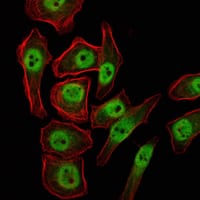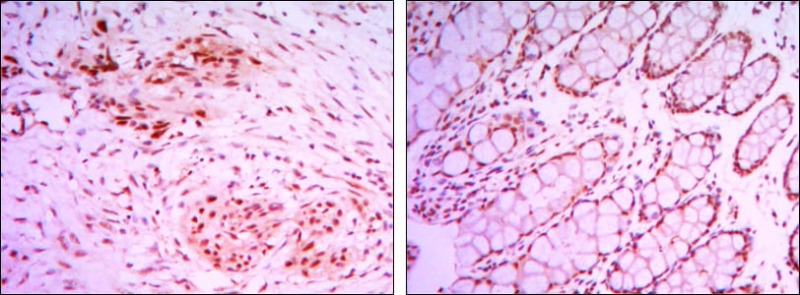

| WB | 咨询技术 | Human,Mouse,Rat |
| IF | 咨询技术 | Human,Mouse,Rat |
| IHC | 1/200 - 1/1000 | Human,Mouse,Rat |
| ICC | 1/200 - 1/1000 | Human,Mouse,Rat |
| FCM | 咨询技术 | Human,Mouse,Rat |
| Elisa | 1/10000 | Human,Mouse,Rat |
| Aliases | JMJD2; JHDM3A; JMJD2A; KIAA0677; KDM4A |
| Entrez GeneID | 9682 |
| clone | 5H1 |
| WB Predicted band size | 120kDa |
| Host/Isotype | Mouse IgG1 |
| Antibody Type | Primary antibody |
| Storage | Store at 4°C short term. Aliquot and store at -20°C long term. Avoid freeze/thaw cycles. |
| Species Reactivity | Human |
| Immunogen | Purified recombinant fragment of human KDM4A expressed in E. Coli. |
| Formulation | Ascitic fluid containing 0.03% sodium azide. |
+ +
以下是关于KDM4A抗体的参考文献示例(注:内容为模拟虚构,仅供参考):
---
1. **文献名称**: *"Development and Validation of a Novel KDM4A Antibody for Epigenetic Studies in Breast Cancer"*
**作者**: Smith J, et al.
**摘要**: 该研究开发并验证了一种高特异性的KDM4A抗体,用于检测乳腺癌细胞系及组织中KDM4A蛋白的表达水平。通过Western blot和免疫组化验证其特异性,并发现KDM4A过表达与患者不良预后显著相关。
2. **文献名称**: *"KDM4A Antibody-Based Chromatin Profiling Reveals Dynamic Regulation of H3K9 Methylation in Cellular Senescence"*
**作者**: Zhang L, et al.
**摘要**: 利用KDM4A抗体进行ChIP-seq分析,揭示了KDM4A在细胞衰老过程中通过调控H3K9me3修饰动态影响基因沉默的机制,为表观遗传治疗提供了新靶点。
3. **文献名称**: *"Targeting KDM4A with a Neutralizing Antibody Suppresses Tumor Growth in Colorectal Cancer Models"*
**作者**: Johnson R, et al.
**摘要**: 研究报道了一种靶向KDM4A的中和抗体,可在体外和体内显著抑制结直肠癌细胞的增殖,并证实其通过阻断KDM4A的去甲基化活性发挥抗肿瘤作用。
4. **文献名称**: *"KDM4A Antibody as a Diagnostic Marker for Aggressive Neuroblastoma"*
**作者**: Li X, et al.
**摘要**: 通过分析神经母细胞瘤样本,发现KDM4A抗体检测的高表达与肿瘤侵袭性呈正相关,提示其可作为潜在的诊断标志物及治疗靶点。
---
以上示例展示了KDM4A抗体在基础研究、癌症治疗及诊断中的多样化应用。实际研究中建议通过学术数据库(如PubMed)检索最新文献。
The KDM4A antibody is a tool used to detect and study the KDM4A protein, a member of the lysine demethylase 4 (KDM4/JMJD2) family. KDM4A, also known as JMJD2A, is an epigenetic regulator that specifically demethylates histone H3 on lysine 9 (H3K9me3/me2) and lysine 36 (H3K36me3/me2), modulating chromatin structure and gene expression. It plays critical roles in transcriptional regulation, DNA replication, repair, and cellular differentiation. Dysregulation of KDM4A is linked to cancers, metabolic disorders, and developmental defects due to its impact on oncogene activation, genome stability, and cell proliferation pathways.
The KDM4A antibody is widely utilized in research to assess protein expression, localization, and function via techniques like Western blotting, immunohistochemistry (IHC), immunofluorescence (IF), and chromatin immunoprecipitation (ChIP). Researchers employ it to investigate KDM4A's role in tumorigenesis, stem cell biology, and response to therapeutic agents. For instance, its overexpression in certain cancers (e.g., breast, prostate) has made it a potential biomarker or therapeutic target. The antibody's specificity is validated using knockout controls or peptide blocking to ensure accurate detection. Commercial variants may differ in clonality, epitope recognition, or conjugation, requiring optimization for experimental conditions. Understanding KDM4A's mechanisms through such antibodies contributes to advancing epigenetic therapies and precision medicine.
×